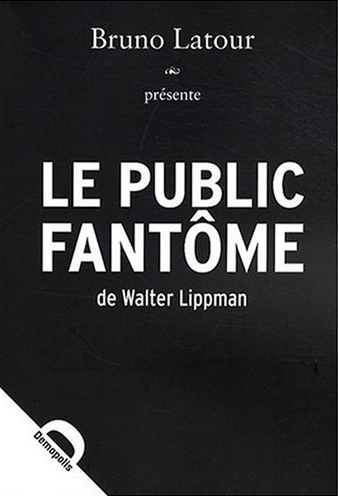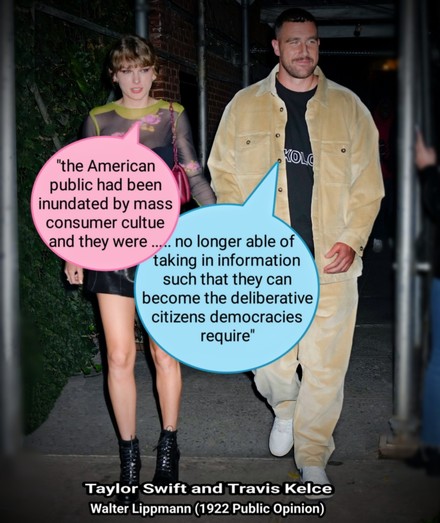- In his Public Opinion Lippmann argues that most people only engage with the world beyond their milieu for a small time each day and that the main means through which they do so is text. This provides an interesting reference point for understanding how social media has changed our relationship to the public sphere: our engagement now tends to be multimodal and patterns of use of social media mean it seeps into everyday life in a porous fashion, as opposed to being a specialised activity we engage in at a routinised point in the day.
- Is what he describes as “public affairs” co-extensive with the “the public sphere”? ^^What was his definition of public affairs^^?
- He’s a more ambiguous and nuanced thinker than Chomsky led me to believe. The crucial point is that citizens are not inherently competent for public affairs and that this represents a challenge which many have evaded for a range of ideological reasons. Obviously it remains a contested question what ‘competent’ can and should mean but underlying it is a very significant point: once we move beyond a society that is “completely self-contained in its interests and so small that everyone can know all about everything that happens” then our “ideas deal with events that are out of sight and hard to grasp”. These ideas and the actions they lead to are significant for public life, hence the challenge. His point is that we need an “independent, expert organisation for making the unseen facts intelligible to those who have to make the decisions” because there will always be a gap between immediate experience and wider events of potential concern within a society that is moved beyond a certain level of complexity.
- I find his underlying framing of the media extremely persuasive: to traverse the world men must have maps of the world. His point is that those representations have consequences because they shape action, even if it is the reality beyond the representation which accounts for the success or otherwise of that action. Whatever we believe to be a ‘true picture’ of our environment will determine how we act within and in relation to that environment.
- I found his account of ‘social set’ interesting as a theory of normative reference groups. This is integral to what Maggie is talking about as [[communicative reflexivity]], with Lippman’s framing helping us see how these are bound up in the reproduction of status and material position:
- > Our social set consists of those who figure as people in the phrase “people are saying”; they are the people whose approval matters most intimately to us. In big cities among men and women of wide interests and with the means for moving about, the social set is not so rigidly defined. But even in big cities, there are quarters and nests of villages containing self-sufficing social sets. In smaller communities there may exist a freer circulation, a more genuine fellowship from after breakfast to before dinner. But few people do not know, nevertheless, which set they really belong to, and which not.
- I do see Chomsky’s point now I’ve listened to Lippmann talk about the deadening conditions of the worker and the effect they have on their inability to reason in a way he deems adequate. However whereas Lippmann sees this as an argument for experts to steer democracy, there’s a socialist response which is to argue that capitalist labour is incompatible with democratic citizenship and that it’s capitalist labour which needs to change ✊
- This is how he describes the challenge involved in thinking in circumstances where [[distraction]] is ubiquitous in chapter 5 of public opinion:
- > If the comparatively simple conditions of a laboratory can so readily flatten out discrimination, what must be the effect of city life? In the laboratory the fatigue is slight enough, the distraction rather trivial. Both are balanced in measure by the subject’s interest and self-consciousness. Yet if the beat of a metronome will depress intelligence, what do eight or twelve hours of noise, odor, and heat in a factory, or day upon day among chattering typewriters and telephone bells and slamming doors, do to the political judgments formed on the basis of newspapers read in street-cars and subways? Can anything be heard in the hubbub that does not shriek, or be seen in the general glare that does not flash like an electric sign? The life of the city dweller lacks solitude, silence, ease. The nights are noisy and ablaze. The people of a big city are assaulted by incessant sound, now violent and jagged, now falling into unfinished rhythms, but endless and remorseless. Under modern industrialism thought goes on in a bath of noise. If its discriminations are often flat and foolish, here at least is some small part of the reason. The sovereign people determines life and death and happiness under conditions where experience and experiment alike show thought to be most difficult. “The intolerable burden of thought” is a burden when the conditions make it burdensome. It is no burden when the conditions are favorable. It is as exhilarating to think as it is to dance, and just as natural. Every man whose business it is to think knows that he must for part of the day create about himself a pool of silence. But in that helter-skelter which we flatter by the name of civilization, the citizen performs the perilous business of government under the worst possible conditions. A faint recognition of this truth inspires the movement for a shorter work day, for longer vacations, for light, air, order, sunlight and dignity in factories and offices. But if the intellectual quality of our life is to be improved that is only the merest beginning. So long as so many jobs are an endless and, for the worker, an aimless routine, a kind of automatism using one set of muscles in one monotonous pattern, his whole life will tend towards an automatism in which nothing is particularly to be distinguished from anything else unless it is announced with a thunderclap. So long as he is physically imprisoned in crowds by day and even by night his attention will flicker and relax. It will not hold fast and define clearly where he is the victim of all sorts of pother, in a home which needs to be ventilated of its welter of drudgery, shrieking children, raucous assertions, indigestible food, bad air, and suffocating ornament.
- His critique of ‘economic determinism’ is curiously reminiscent of Maggie’s attack on the concept of ‘vested interests’ as it tends to be deployed. Lippmann argues that these interests will enter into how someone believes but not determine what they believe. Maggie’s point is that it doesn’t determine what they will do as a consequence of those beliefs.
- I found this passage from Lippmann’s Public Opinion reminiscent of what C Wright Mills later described as the sociological imagination. This meant for Mills a sensitivity towards the interconnection between private troubles and public issues, enabling someone to see how the seemingly idiosyncratic facts of their lived experience are shaped by wider social and historical forces. It’s an antidote to the individualisation of social problems by making clear how the circumstances we confront are not of our choosing and furthermore they are confronted by others for similar reasons. What Lippmann describes her is the absence of sociological imagination, with my emphasis added:
- > The character they give it varies not only with sex and age, race and religion and social position, but within these cruder classifications, according to the inherited and acquired constitution of the individual, his faculties, his career, the progress of his career, an emphasized aspect of his career, his moods and tenses, or his place on the board in any of the games of life that he is playing. What reaches him of public affairs, a few lines of print, some photographs, anecdotes, and some casual experience of his own, he conceives through his set patterns and recreates with his own emotions. He does not take his personal problems as partial samples of the greater environment. He takes his stories of the greater environment as a mimic enlargementof his private life.
- Lippmann sees media as being about providing a picture of the world beyond one’s immediate milieu. This is necessary for citizenship in a complex society but it’s something that needs to be enacted institutionally because of the cognitive and structural limitations on the ability of a citizen to gain this knowledge otherwise. These institutions inevitably come with severe limitations, marked by the context in which they emerged. It’s fruitful to consider social media in these terms as seemingly offering an immediate personalised way of gaining direct knowledge from beyond our context, with this human quality contrasting sharply to the mediated and self-serving character of MSM institutions. The reality of course is that both are engineered, both involve discreet interests rarely disclosed and each presents what is in a sense a misleading view of the world beyond our milieu.
- The way he writes about the theory of the ‘omnicompetent citizen’ positions it as an implausible set of beliefs rather than a foundational assumption for democratic theory.
- The way Lippmann describes “that freedom of mind when men are not too immediately concerned by practical decision” is incredibly reminiscent of Bourdieu on [[skhole]].
- The way he describes “a certain sustaining techne” which animates the confidence of the natural scientists is interesting for thinking about the politics of discipline surrounding computational social science.
- He argues the media “can only report what has been reported for it by other institutions” suggesting that facts are produced by institutions and circulated through the media.
https://markcarrigan.net/2024/08/29/my-notes-on-walter-lippmanns-public-opinion/
#media #publicOpinion #publicSphere #walterLippmann

